 |
|||||
|
|||||
| Preview of Stamps Catalogue: VOLUME 1 |
 |
|||||
|
|||||
| Preview of Stamps Catalogue: VOLUME 1 |
Return To Catalogue - Great Britain Overview - Queen Victoria 1855-1886, part 2 - Queen Victoria, Large sized stamps - Queen Victoria 1887 issue - Penny Black and similar types
Note: on my website many of the
pictures can not be seen! They are of course present in the catalogue;
contact me if you want to purchase it.
4 Pence red 6 Pence violet 1 Shilling green
For the specialist, the 4 p stamp has watermark 'Chain' (3 types). The 6 p and 1 Sh have watermark 'Flowers in the four corners'. All stamps are perforated 14.

(Watermark 'Flowers in four corners')
Value of the stamps |
|||
vc = very common c = common * = not so common ** = uncommon |
*** = very uncommon R = rare RR = very rare RRR = extremely rare |
||
| Value | Unused | Used | Remarks |
| 4 p | RR | ** | |
| 6 p | RR | *** | |
| 1 Sh | RR | R | |
I've seen cuts from Philympia 1970 stamps of the 4 p stamp offered as 'reprints'.

Philympia set of stamps of 1970 on cover.
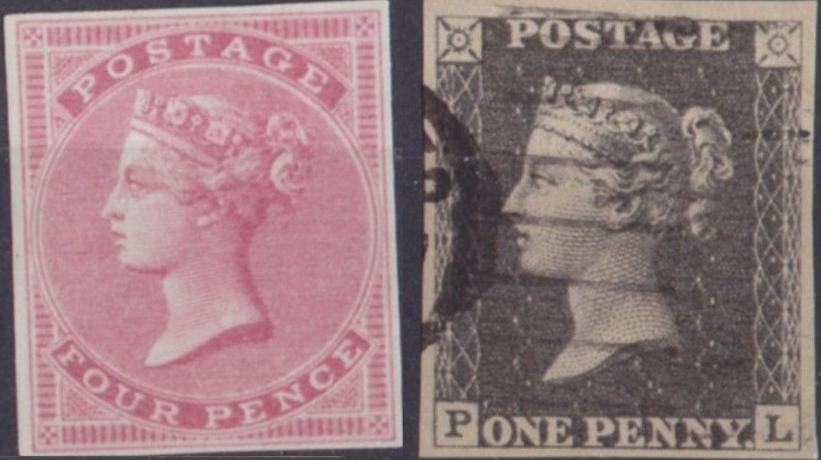
Cuts from 1970 Philympia stamps. Any uncancelled 1 p black stamps
with 'PL' corner letters (or with 'modern' cancels) most likely
come from these commemorative stamps.
Halfpenny blue Halfpenny green (1883) 1 1/2 Penny brown 2 Pence red 5 Pence blue
These stamps have watermark 'Crown' and are perforated 14.
Value of the stamps |
|||
vc = very common c = common * = not so common ** = uncommon |
*** = very uncommon R = rare RR = very rare RRR = extremely rare |
||
| Value | Unused | Used | Remarks |
| 1/2 p green | * | * | |
| 1/2 p blue | * | c | |
| 1 1/2 p | *** | * | |
| 2 p | R | *** | |
| 5 p | RR | *** | |
3 Pence red 4 Pence red 6 Pence violet 9 Pence brown 1 Shilling green
The 4 p has watermark 'Chain'. All other values have watermark 'Flowers in the four corners'. All stamps are perforated 14.

(Watermark 'Flowers in the four corners')
Value of the stamps |
|||
vc = very common c = common * = not so common ** = uncommon |
*** = very uncommon R = rare RR = very rare RRR = extremely rare |
||
| Value | Unused | Used | Remarks |
| 3 p | RR | R | |
| 4 p | RR | * | |
| 6 p | RR | *** | |
| 9 p | RR | RR | |
| 1 Sh | RR | *** | Plate 1 |
3 Pence red 4 Pence red 6 Pence violet 6 Pence brown (different type, 1872) 6 Pence grey (different type, 1872) 9 Pence yellow 10 Pence brown 1 Shilling green 2 Shillings blue 2 Shillings brown
All stamps are perforated 14. Plate numbers are now included in the design. Various watermarks were used.
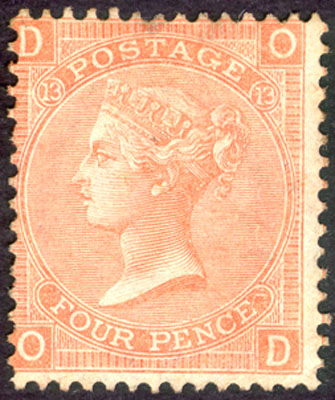
(4 p, plate number '13')
Value of the stamps |
|||
vc = very common c = common * = not so common ** = uncommon |
*** = very uncommon R = rare RR = very rare RRR = extremely rare |
||
| Value | Unused | Used | Remarks |
Watermark 'Flowers in four corners' |
|||
| 3 p | RR | *** | Plate 4 |
| 6 p violet | RR | *** | Plates 5 and 6 |
| 9 p | RRR | RR | Plates 4 and 5 |
| 1 Sh | RR | *** | Plate 4 |
| Watermark 'Chain' | |||
| 4 p | RR | ** | |
| Watermark 'Rose' | |||
| 3 p | RR | ** | Plates 4 to 10 |
| 6 p violet | R | *** | Plates 6 to 10 |
| 6 p brown | RR | *** | Plate 11 |
| 6 p grey | RR | *** | Plate 12 |
| 9 p | RR | R | Plate 4 |
| 10 p | RR | R | Plates 1 and 2 |
| 1 Sh | RR | ** | Plates 4 to 7 |
| 2 Sh blue | RR | R | Plates 1 and 3 |
| 2 Sh brown | RRR | RRR | Plate 1 |

Strange cancel on the 2 Sh blue stamp.
A collaborator of the Stock Exchange in London used these forgeries on telegraph forms in 1872 and 1873 (he then could resell the genuine stamps for his own profit). The forms were stored for the next 20 years and the forgeries were only discovered in 1898 when the forms were sold to a stamp dealer! Most, if not all, of these forgeries have the cancel 'STOCK EXCHANGE' in a circle with a date somewhere between 1872 and 1873 (these cancels are genuine of course). Many hundreds of these forgeries could have been used in a single day (according to Album Weeds). There are two types of these forgeries, one with plate number 5 and another with plate number 6 (with many corner letter combinations, even impossible ones). They are both lithographed instead of engraved, they bear no watermark (the genuine stamps do). The distinghuishing characteristics were found in 'Postal Forgeries of the World' by H.G. Leslie Fletcher. Some exist with corner letters that never existed as genuine stamps. See 'The mystery of the Shilling green' by Fred J.Melville (1926) for more information, which can also be downloaded at http://www.philatelicsannex.org/reference/reference.html.
Stock exchange forgery of plate 5:

(Left genuine stamp, right forgery)
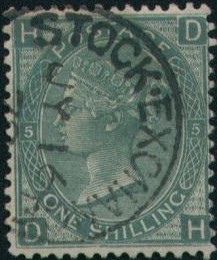

(Stock-Exchange forgeries, plate '5')
The first type (plate 5) is has the corner letters large and ragged. The corner squares seem to be rounded at the angles. The line pattern just to the right of the 'E' of 'POSTAGE' is different in this forgery. Furthermore, there is a large white space besides the nose. These forgeries were used from June 1872 to October 1872.
The second type (plate 6) has the white rectangle around the plate number too thick and the '6' larger than the genuine. These forgeries were used from October 1872 to June 1873.
The 2 Sh brown has been forged by other forgers:


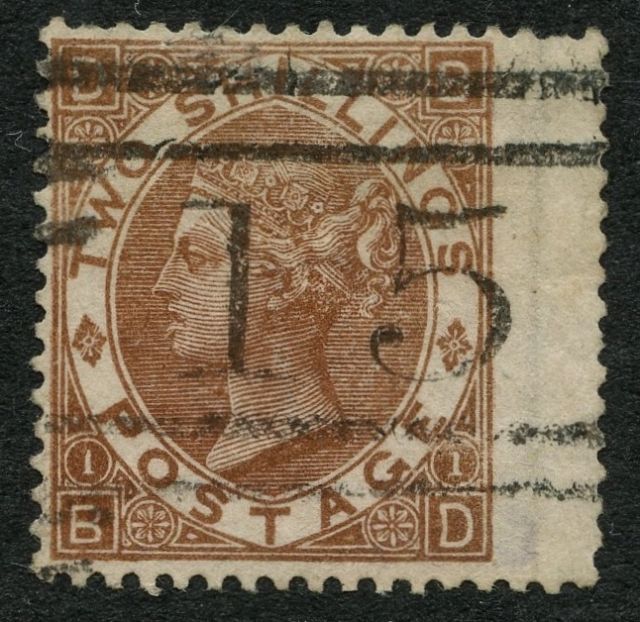
This forgery is made on watermarked paper. The "S" of
"POSTAGE" is different from a genuine stamp. Next to it
the same forgery, but now without watermark. Note the same
numeral cancel "15" on two of the above forgeries.

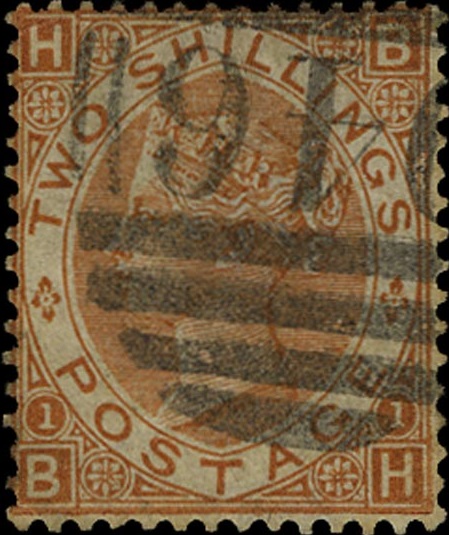
I've been told that this is a 'Brussels' forgery with a
"946" Middlesborough cancel, I have no further
information.

I've been told that this is a die-proof of a Paris forgery, I
have no further information.
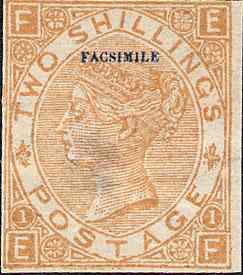
A Senf forgery with overprint
"FACSIMILE"
The forger Sperati has also made forgeries of the 2 Sh brown. These forgeries are extremely deceptive. Pictures of these forgeries can be found at: http://www.seymourfamily.com/rfrajola/Sperati/speratiindex.htm (Richard Frajola's Sperati website). Apparently he forged stamps with corner letters 'K L', 'J K', 'L J' and 'I P'. The cancels and paper that Sperati used are genuine (he bleached genuine stamps of lower value and printed his forged design on top of it).



Front and backside of a Sperati forgery, here with "SPERATI
REPRODUCTION"' on the back.

Sperati 'proof' of a 'J K' forgery.

I've been told that this stamp with "A S" corner
letters is also a Sperati forgery.

I've been told that this is a Sperati forgery as well, I have no
further information.
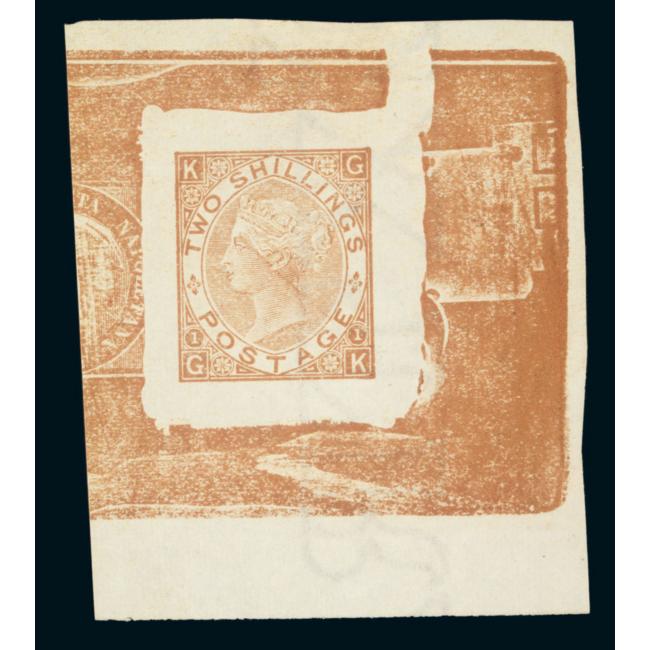
Another unfinished forgery, with part of a forged Naples stamp on
the left hand side.

Another forgery with "K G" corner letters.
For more stamps of Great Britain with Queen Victoria, issued from 1870 to 1886, click here. For stamps with Queen Victoria, but larger sized click here, Queen Victoria 1887 jubilee issue click here or Penny Black and similar stamps click here.
Stamps - Timbres - Briefmarken - Postzegels